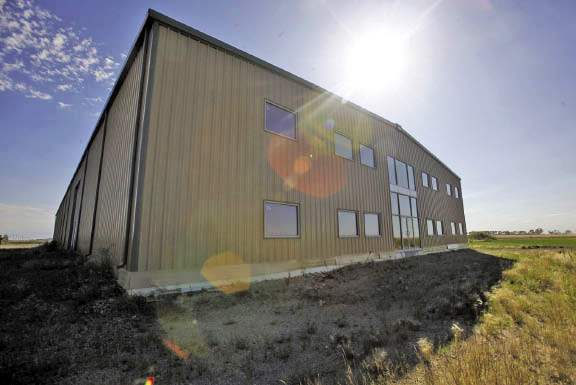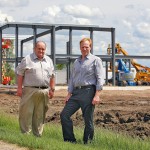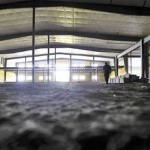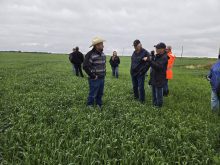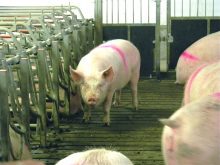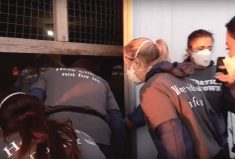How a community’s bid to revive its fortunes attracted a pile of taxpayers’ money and a whole lot of grief
He has no employees, no products, and no factory.
But every day Keith Hannah walks into a small office building across from Innes’ Garage in Waskada, hoping to salvage some part of his dream — creating a Peak of the Market-style business for health foods in the province’s smallest incorporated municipality.
“I’m trying to get things straightened around,” said Hannah. “I lost a lot of money in this myself, a lot, and I’ve got other investors here who have lost a fair bit of money as well.”
Read Also

Mazergroup’s Bob Mazer dies
Mazergroup’s Bob Mazer, who helped grow his family’s company into a string of farm equipment dealerships and the main dealer for New Holland machinery in Saskatchewan and Manitoba, died July 6 from cancer.
Taxpayers have taken a bath, too. As part of its “Economic Action Plan,” Ottawa pumped $3.1 million into Farm Genesis Group Marketing Inc. in 2010.
But as soon as the money came in, it was flying out the door.
One consultant charged $160,000 for just four months’ work — although Farm Genesis also had to loan him a computer. Machinery was bought, never installed, and later sold at a discount.
Today, questions about the defunct company loom as large as its empty steel building — the size of two Olympic swimming pools — located a few streets south of the Farm Genesis office. It has no plumbing and a dirt floor.
What went wrong?
Federal officials won’t comment and the principals aren’t saying much either, partly because of a gag order written into their federal loan agreement.
But an eight-month-long investigation by the Manitoba Co-operator has uncovered a cautionary tale for those seeking government cash in hopes of establishing a value-added industry and reviving a local economy — more money can bring more trouble.
Genesis
In October 2005, Waskada’s future looked dim.
The town’s population was about to slip under the 200 mark, canola was just $5 a bushel, and today’s oil boom was years away.
But no one was willing to let the 138-year-old village disappear without a fight. The plan was to build a biodiesel plant, and 32 community-minded people invested $5,000 apiece to launch Borderland Biodiesel Ltd.
Although he had no experience with this kind of business, Hannah was named president of the new company.
“I got the job because I farmed the least amount of land and the other guys were pretty busy,” he said.
The group managed to garner $270,000 in provincial and municipal grants and commissioned a feasibility study, leading them to turf the biodiesel idea and replace it with a new dream: specialty health foods beginning with a line of hemp products.
Markus Schmulgen, a 12-year veteran of the Portage Food Development Centre, was hired in early 2007 as a consultant and wrote the business plan for the rechristened Farm Genesis Group.
With limited funds, the principals took a slow-but-steady approach: trips to trade shows in Germany and San Diego to get a feel for markets; a website; and the first sales of hemp protein powder, toasted seeds, and oil. The products were bought — most or all from Ste. Agathe-based Hemp Oil Canada, which also packaged them using the stylized, colourful Farm Genesis logo.
But then came the recession and a government eager to fund ‘shovel-ready’ projects to provide economic stimulus. Hemp Oil Canada president Shaun Crew, who says he’s still owed “tens of thousands of dollars” by Farm Genesis, was stunned by the January 2010 announcement that Ottawa was providing $4.9 million of “federal funding” to the fledgling company.
“It’s very frustrating,” said Crew. “I mean we did it the hard way (building our company) and they were given the golden handshake. And now they’re not even operating and they’re not paying their bill.”
- Farm Genesis president Keith Hannah, (l) and former CE0 Markus Schmulgen on site of the processing plant in Waskada as construction got underway.
- The building stands today as an empty shell.
A host of troubles
The money — which a federal official insists wasn’t a loan but rather a ‘repayable contribution’ — required the fledging company to move quickly. Even though it didn’t have an established product or firm sales contracts, Farm Genesis began building a 25,000-square-foot plant and, with the help of consultants, went to Chicago to buy processing machinery.
“They took us to what was basically used car lots for equipment,” said one source close to the project, adding the machinery wasn’t the right fit for the factory.
It was never installed and later sold at an auction in Saskatoon.
In April 2011, Farm Genesis filed a lawsuit against Ben Comis Consulting asking for the return of $168,000 (and a laptop). It its statement of claim, Farm Genesis alleges one of Comis’s duties was to “produce a U.S. retail marketing launch” — something Comis denies in his statement of defence.
The company also hired Comis’s father Barry to oversee construction of the factory, but he left before it was completed.
“There was no real fuss or muss about it, it was pretty obvious they had no money and they weren’t going to be able to pay me,” said Barry Comis.
Today, Hannah said his group was let down by the consultants.
“They didn’t get done what they had to do,” he said.
The group suffered another blow when a German client reneged on a promise to buy products that Farm Genesis was sourcing from others and reselling under its label, a source said.
The fledging company was counting on the deal to generate cash flow while it built its plant, but instead the client went directly to a supplier to avoid the middleman markup.
Another disappointment was “Hemp Moo,” a hemp-based milk-substitute it spent two years developing. The problem was it retailed for more that $2 for a 250-millilitre carton, and grocers wanted Farm Genesis to provide free product to test market acceptance. The product was permanently shelved a year after its launch.
Squeezed for cash, the company turned to the community for another round of funding. But there was little interest — the venture appeared stalled and besides, the oil boom had revived Waskada’s fortunes. According to one insider who spoke on the condition of anonymity, the group had to meet certain equity targets and when it failed to inject additional cash, the final $1.8 million of its original $4.9-million pledge was withheld.
The dream dies
Barely a year after then Brandon-Souris MP Merv Tweed proudly proclaimed that “investments such as this are… laying the foundations for our future prosperity,” it was all over.
“(Farm Genesis) just pulled the plug, it was all they could do, it was going to cost too much money,” said Les McGregor, one of the venture’s biggest investors.
Schmulgen was fired in May 2011 and the remaining board members negotiated a settlement that involved paying back a portion of the federal funding and retaining ownership of the unfinished building.
Manitoba Companies Office records list Hannah, McGregor, and Murray McKinney as the primary shareholders in the company, and many believe they used their own funds to cover some of the company’s debt.
There’s also plenty of speculation about what went wrong. Hannah said the deal with the government forbids him from saying much, while a spokeswoman for Western Economic Diversification said the department “cannot comment” on the deal.
But for others, it’s no mystery.
“I think they were underfunded for what they were trying to do,” Barry Comis said. “This should have been a barnburner.”
He also questions why the federal government gave so much money to a group of people with no experience in food processing that didn’t even feel the need to hire an accountant.
“When you’re running a business you have to have a budget, you have to know how much you have spent and how much you’re allowed to spend to stay on that budget on a day-to-day basis,” said Comis. “You can’t wait ’til the bookkeeper comes back once a month or once a quarter and you read a report.”
It was all too predictable, added Hemp Oil Canada’s Shaun Crew.
“I know exactly why it failed,” he said. “They didn’t have a solid business plan. They didn’t have management that knew what they were doing. These are just — no disrespect — a bunch of farmers who had a dream, and that’s about all it ever was.”
From the ashes
In the press release announcing the government funding, Hannah called it “a great day for Waskada” and praised Ottawa for making “our dreams… a reality.”
That great day seems long ago, now.
“It’s taken its toll on me,” he said. “Even if you haven’t done anything wrong, and most of the people know you haven’t, there’s always some people wondering what happened.”
It was all about helping a town that’s been home to four generations of his family, he said.
“I’ve lived here my whole life, my family was raised here… I think the world of Waskada,” he said. “I wouldn’t want to live anyplace else.”
But he does have some hard-earned words of wisdom for those looking to bring a new development to rural communities.
“The advice I would give to anybody is not to get too big, to take it slow,” he said. “You learn from it I guess, but I’m 71 years old so I’m probably not going to be doing another project.”
Although he’s never earned a salary, Hannah is still working to find a buyer for his company that would provide local jobs, pay off the remaining debts, and maybe provide a return on investment for shareholders.
Vancouver-based Abattis Bioceuticals Corp. has expressed interest in purchasing the business, giving Hannah reason to hope that selling Farm Genesis may finally accomplish what he and other investors set out to do in the first place.
“If that building could get going, be up and running and be some kind of business for the town that will create a few jobs, then I think most people here would be pretty satisfied that it finally worked out to what we wanted to do,” he said. “As far as the shareholders, myself and the farmers, there’s nothing been done wrong here… other than that we didn’t get the job done.”





